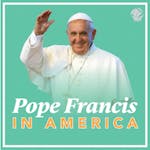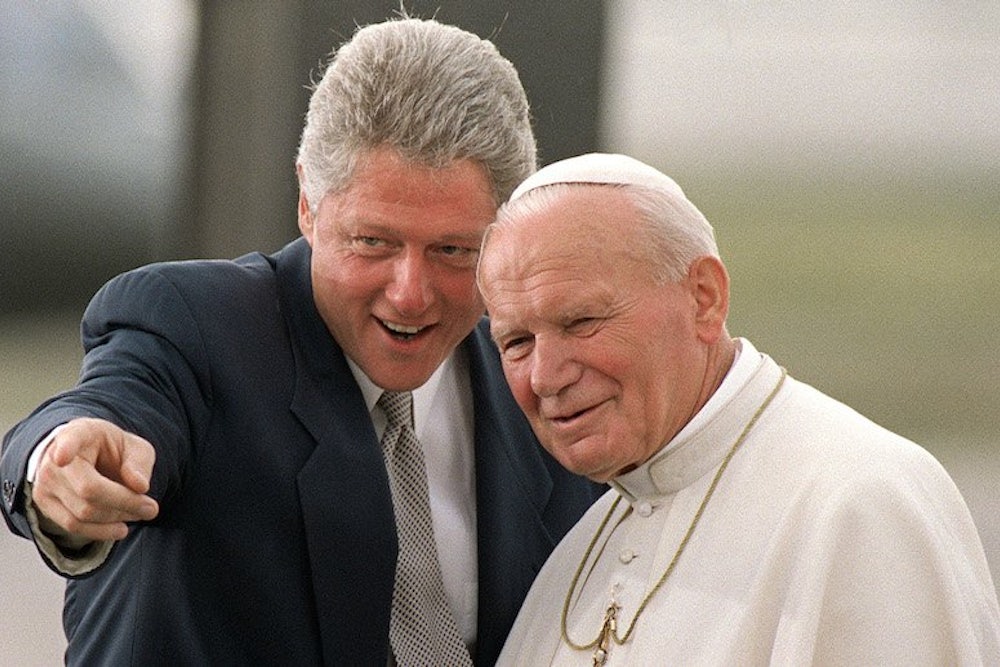
This week, his holiness the Pope arrives in the U.S. for the first time in seven years. Francis’s first stop in Washington, D.C. is currently the “hottest ticket” in the capital, and news has spread that he is planning to use a retrofitted Jeep Wrangler as his American Popemobile, and that his security team is prepared for unprecedented levels of papal spontaneity. With a session scheduled for the U.N. General Assembly in New York, and a papal mass in Philadelphia expected to draw upwards of one million people, it is no surprise that the particulars of the travels of a religious figure believed by a billion people to be a direct link to Christ on earth are all over the media. But what does a Papal visit to the U.S. really mean, if anything?
Beginning in 1797, the U.S government had maintained, for the most part, a cordial diplomacy with the Papal States. In 1867, however, the government cut off funding for diplomatic missions to the States after a rumor spread about the curbing of religious freedoms for Protestant Americans within the States (this was later proved false). Before leaving Rome, the American minister to the pope sent along a message from his Holiness: “The Pope himself feels hurt by the hasty and apparently groundless action by Congress and thinks it an unkind and ungenerous return for the good will he has always manifested towards the American government and people.” In less than three years, the Papal States themselves would be dissolved in the Risorgimento. Italy was unified by Victor Emannuel and the pope remained stateless until 1929, when Prime Minister Benito Mussolini encouraged the creation of the Vatican City State, which would be recognized by the Italian government. The U.S., however, would not reopen diplomatic relations with the Vatican until 1984.
Historically, Protestant-majority America has been uncomfortable with the combination of political and supernatural power the Pope appears to represent. Is he there to sway the masses, and if so, in which direction will they sway? Although the separation of church and state should protect us, we have often needed extra reassurance from Catholics, which is why presidential candidate JFK had to be so careful to disavow Papal influence in his landmark 1960 speech, affirming his belief in an America where “no public official either requests or accepts instructions on public policy from the Pope, the National Council of Churches or any other ecclesiastical source.”
Despite the diplomatic chill, the first papal visit to the U.S. occurred in 1965, when Pope Paul VI made the trip; however, President Johnson did not meet with his fellow head-of-state on that visit. Since then, Catholic-wariness has lessened: Pope John Paul II visited the U.S. seven times starting in 1979, and he got to meet Presidents Carter, Bush, Reagan, and Clinton. Pope Benedict made one U.S. visit in 2008, but his reception was cool compared to the anticipation surrounding Francis’s visit.
Francis’s recent “homecoming” tour of South America followed an itinerary he apparently selected himself, and he did not hold back in voicing political criticisms: “to defend the planet and the poor.” Francis’s express reason for his first visit to the U.S. is the annual World Meeting of Families in Philadelphia. Observers may wonder how that event jibes with his famous comments on homosexuality (“who am I to judge?”), or his speech about welcoming divorced and remarried Catholics into the fold, or his statement that we should forgive women for having abortions.
In the U.S., the most interesting politics of Pope Francis’s visit may not be what the Pope says or who he meets with, but how American Catholics respond. One thing is for sure: they will not all react in the same way. Earlier this summer when Pope Francis’s encyclical on climate change, Laudato Si, was released, the ensuing media maelstrom revealed the deep divide in American Catholicism. (“[Our common home] now cries out to us because of the harm we have inflicted on her by our irresponsible use and abuse of the goods with which God has endowed her.”) Progressive Catholics, even some bishops, cheered the Pope’s call for environmental stewardship as a return to classic Catholic ideals of social justice. But the conservative critiques came quickly and in a wide variety of forms: chiding the Pope for not being an economist or a scientist, claiming that he was trying to turn back progress and modernity, or that the whole climate-change thing was basically a metaphor, or that the Pope was just too pessimistic. The conservative distancing seemed to work, for a while: Francis’s American approval numbers officially plummeted. Still, the New York Times recently speculated that the “Francis effect” would hold GOP Presidential candidates in a tough spot when it came to the politics of climate change.
Jeb Bush, a Catholic convert who back in March had talked up the importance of his faith, abruptly distanced himself from Francis’s climate-change stance in a statement that sounds like an ironic echo of Kennedy’s 1960 speech: “I don’t get economic policy from my bishops or my cardinals or my pope.” As well he shouldn’t. What Bush either neglected to notice or adroitly avoided, however, was the way in which Francis had shifted the conversation about climate change from “economic policy” to a moral issue, exactly the sort of thing we Americans might expect a political candidate “guided by faith” to pay attention to, like they pay attention to “values issues” like birth control policy and gay marriage. But for Republicans, climate change will remain a strictly economic issue as long as fossil-fuel money funds campaigns. Times have changed since Kennedy had to assure people he wouldn’t bow to an Old World church. American Catholics, at least the older, whiter segment of believers, are more conservative than this Pope himself.
But among the younger, more Hispanic community of American Catholics, there is still solid support for this Pope. (See a detailed demographic breakdown of American Catholics from the Public Religion Research Institute here.) And both sides are preparing for the Pope’s visit, liberals with excitement and conservatives with anxiety. According to the New York Daily News, a former Catholic priest currently imprisoned for his involvement in the child-abuse scandal has been moved from the Philadelphia prison that the Pope was scheduled to visit. And it was reported last month that an LGBT Catholic group that had planned to hold an event on gender identity at a local parish to coincide with the World Meeting of Families has been barred from doing so by the local Archbishop. (The event will go on at another location.) At the same time, the Nuns on the Bus, a group of Catholic sisters dedicated to promoting the social justice priorities they believe Francis shares, are timing their latest tour to end in Washington at the time of the Pope’s visit. They are not officially on the Pope’s agenda, but they’re hopeful that some of his famous spontaneity will be turned their way.
